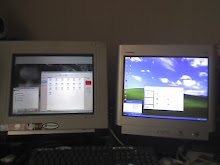Some time ago, I posted an entry in Spanish about some common errors in spelling that some people may experience.
I know that in this age of "smart" phones, "texting", "chatting" and more, people try to shorten words by abbreviating them, but this also has a negative impact in the future: These people will not be able to differentiate between the correct and incorrect way of writing those words.
Some of the aberrations I have noticed in English:
Your instead of You're (or the other way around): Your denotes ownership, you're is the contraction for you are (i. e.: I like your laptop, in this case, the laptop is yours; I know that you're a very smart person, in this case, you're is substituting you are).
This same problem applies to their, there and they're. There denotes location, not here, but there, far from where you are.
It also applies to its and it's, the first one denoting ownership, the second being a contraction.
Person - verb correlation: He, she, it is, not are or am. You are, not is. You have, not has. He, she, it has, not have. Again, if you are using contractions, you use the apostrophe and the appropriate part of the verb.
Proper tense of the verb: In English, verbs have three tenses: Present, past and past participle. There is also the infinitive. The proper use of the tense is important. Sentences with the verb to have followed by another verb denote a present or past participle, in which cases, the verb has to be in past participle and not in present or past (i. e.: I have bought a new program is the proper way and not I have buy a new program).
There are some more, a lot more aberrations in English too, but I wanted to mention only the most common ones.
Regards,
F. Bobbio C.
Thursday, February 4, 2010
How To Create Your Own Web Page
This topic comes to my ears from time to time: How do you create your own web page?
First of all, this text is just a draft of what you need and lists only the basic steps to have your own web page up and running in an easy way.
1) Content: The most important part of a web page is its content, so get the ball rolling and start writing your texts for the content. Time and time again, people ask me to create a simple web page, but when asked about the texts, they fail to provide them to me, so I cannot help them at all.
2) Images: Words are always nice to have in a webpage, but pictures or images can help a lot.
2) A web page hosting: This can be your own server, if you have one, in which case, your modem/router has to be set accordingly to allow connections to port 80.
3) The coding: This can be HTML, Ajax, PHP, Flash, CSS, you name it. The simplest web pages are created in HTML. I personally have not cared enough as to learn HTML, since I use a program called FrontPage, from Microsoft, which creates the HTML for me.
4) FTP program: Web pages are created locally (on your computer or the computer of the web page designer) and then "uploaded" to the host using an FTP (File Transfer Protocol) program. I use FireFTP for Mozilla Firefox, gFTP in Linux or Filezilla in Microsoft Windows.
5) Time, time, time ... and patience: Do not expect the texts to create themselves or the first draft for your web page to be flawless.
Regards,
F. Bobbio C.
First of all, this text is just a draft of what you need and lists only the basic steps to have your own web page up and running in an easy way.
1) Content: The most important part of a web page is its content, so get the ball rolling and start writing your texts for the content. Time and time again, people ask me to create a simple web page, but when asked about the texts, they fail to provide them to me, so I cannot help them at all.
2) Images: Words are always nice to have in a webpage, but pictures or images can help a lot.
2) A web page hosting: This can be your own server, if you have one, in which case, your modem/router has to be set accordingly to allow connections to port 80.
3) The coding: This can be HTML, Ajax, PHP, Flash, CSS, you name it. The simplest web pages are created in HTML. I personally have not cared enough as to learn HTML, since I use a program called FrontPage, from Microsoft, which creates the HTML for me.
4) FTP program: Web pages are created locally (on your computer or the computer of the web page designer) and then "uploaded" to the host using an FTP (File Transfer Protocol) program. I use FireFTP for Mozilla Firefox, gFTP in Linux or Filezilla in Microsoft Windows.
5) Time, time, time ... and patience: Do not expect the texts to create themselves or the first draft for your web page to be flawless.
Regards,
F. Bobbio C.
Subscribe to:
Posts (Atom)
